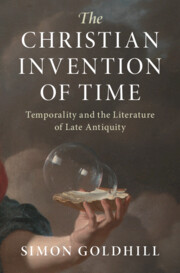Book contents
- The Christian Invention of Time
- Greek Culture in the Roman World
- The Christian Invention of Time
- Copyright page
- Contents
- Acknowledgements
- Abbreviations of Ancient Sources
- Introduction
- Part I
- Part II
- Chapter 11 Beginning, Again
- Chapter 12 The Eternal Return
- Chapter 13 Regulation Time
- Chapter 14 Day to Day
- Chapter 15 ‘We Are the Times’
- Coda
- Bibliography
- Index Locorum
- Subject Index
Chapter 14 - Day to Day
from Part II
Published online by Cambridge University Press: 13 January 2022
- The Christian Invention of Time
- Greek Culture in the Roman World
- The Christian Invention of Time
- Copyright page
- Contents
- Acknowledgements
- Abbreviations of Ancient Sources
- Introduction
- Part I
- Part II
- Chapter 11 Beginning, Again
- Chapter 12 The Eternal Return
- Chapter 13 Regulation Time
- Chapter 14 Day to Day
- Chapter 15 ‘We Are the Times’
- Coda
- Bibliography
- Index Locorum
- Subject Index
Summary
For Gregory of Nazianzus, then, Christmas Day is to be experienced as a celebration of the history of the universe and as a living recognition of the transformative epiphany of Jesus Christ, an epiphany that changes how time is lived and perceived by the Christian faithful. Gregory wants to redefine how time is counted, recounted, experienced. Ambrose of Milan at around the same time, over in the West, is rather more modest in his vision. At least at first sight. His hymns are designedly simple and easily memorable in form, though, like William Blake’s lyrics, they are far from simple in their linguistic depth and significance – and they proved extraordinarily influential in the invention of Christian time as well as of the Christian hymnic tradition. These hymns are to be sung by a congregation, and there are reports not just of people singing lustily and of the hymns spreading across Italy, but also of annoyance by Ambrose’s opponents at their success in inculcating particular doctrinal views in the singers. Hymns, that is, are to work not by a preacher telling his audience what to think but by a congregation’s absorption of ideas through repeated performance, by the pleasure of singing.
- Type
- Chapter
- Information
- The Christian Invention of TimeTemporality and the Literature of Late Antiquity, pp. 337 - 379Publisher: Cambridge University PressPrint publication year: 2022

